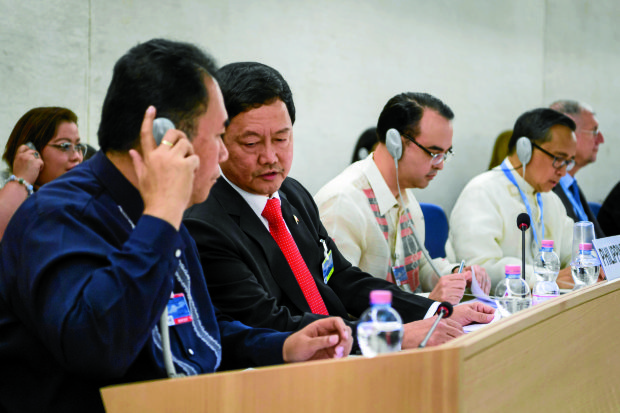Int’l probe of Duterte drug war urged

RIGHTS REVIEW Philippine government officials led by Menardo Guevarra face the United Nations Human Rights Council during its review of the Duterte administration’s human rights record as it carries out its war on drugs. —AFP
An international rights group on Tuesday urged the United Nations Human Rights Council (UNHRC) to investigate President Duterte’s bloody war on drugs and reconsider the Philippines’ membership in the council should killings without accountability continue.
In a statement, Human Rights Watch Geneva director John Fisher said more than 30 countries—including the United States, Japan and Australia—
expressed grave concern during Monday’s Universal Periodic Review of the council of the more than 7,000 drug-related killings in the Philippines under Mr. Duterte.
“Countries from every UN region expressed concern over the deaths in connection with the drug war, with many calling for probes into the killings, and accountability for perpetrators,” Fisher said.
Human cost
“The Philippines is facing a growing chorus of international concern [over] the human cost of President Duterte’s murderous war on drugs,” he added.
A delegation led by Sen. Alan Peter Cayetano, a staunch Duterte ally, defended the war on drugs during the review on Monday, blaming critics of the crackdown—including the “Commission on Human Rights, a senator and some local media”—for the perception that extrajudicial killings are happening in the war on drugs.
Cayetano accused the critics of changing the definition of “extrajudicial killing” to deceive the public and the foreign press that there is “a sudden wave of state-sponsored extrajudicial killings in the Philippines.”
He said killings in previous administrations ranged from 11,000 to 16,000 a year but these were not reported.
But Fisher said “[t]he Philippine government’s denial and deflection of criticism shows it has no intention of complying with its international obligations.”
“The Human Rights Council should establish an international inquiry and, if killings without accountability continue, reconsider the Philippines’ council membership,” he said.
Among the countries that voiced concern over the killings, Fisher said, were Australia, Austria, Botswana, Brazil, Bulgaria, Canada, Chile, Costa Rica, Croatia, Czech Republic, Denmark, Estonia, France, Germany, Ghana, Guatemala, Hungary, Iceland, Ireland, Italy, Japan, Latvia, Lithuania, Luxembourg, Montenegro, the Netherlands, New Zealand, Slovakia, Slovenia, Spain, Sweden, Switzerland, Timor-Leste and the United States.
Those countries urged the Philippine government to investigate the extrajudicial killings and hold accountable those behind the slayings whether police or vigilantes.
Some of them also urged the Philippines to allow UN special rapporteur Agnes Callamard to investigate the killings.
Malacañang said on Tuesday that the Philippines would investigate “everything that needs to be investigated.”
But presidential spokesperson Ernesto Abella also said that while other countries could share their own views, the Philippines would keep on doing what it planned to do.
“So they’re open to comments, they are open to present their own criticisms, opinions. However, we will continue to pursue our own line of action,” Abella told reporters.
He said the administration was not worried about the increasing number of countries voicing concern over the human rights situation in the Philippines.
Mr. Duterte is on “good, strong ground” when it comes to his plan to rid the country of illegal drugs, Abella said.
But lawmakers from the independent minority bloc in the House of Representatives said Malacañang could no longer deny that human rights violations had resulted from Mr. Duterte’s war on drugs.
“I don’t think any country worth its salt in the human rights community would believe the existence of alternative facts when what is being seen are dead bodies of victims of extrajudicial killings,” Albay Rep. Edcel Lagman told a news conference on Tuesday.
Ifugao Rep. Teddy Baguilat said the expression of concern by the 45 member states of the UN Human Rights Council over the extrajudicial killings in the Philippines was a “repudiation” of Cayetano’s claim that the high death toll from the war on drugs was a product of propaganda and “alternative facts.” —WITH REPORTS FROM LEILA B. SALAVERRIA, NIKKO DIZON AND CHRISTINE O. AVENDAÑO